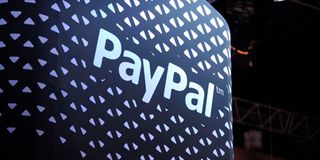PayPal account curbs, cash delays irk users

Logo of online payment company PayPal.
Increased delays in disbursement of cash for Kenyans who receive payments through PayPal have once again turned focus on the quality of customer service offered by the global fintech company.
PayPal is a favourite channel for Kenyans engaged in online transactions such as freelance coding, research, transcription, translation, programming, writing, graphic design and digital marketing. Additionally, companies such as Tiktok, Fiverr, Scribie and Upwork only use PayPal to transact with content generators internationally, making the platform a critical service provider.
Besides delayed cash disbursements, Kenyan users of PayPal have also complained about their accounts being disabled without warning.
“I had to wait for six months to get money that was held in my account, but even after the period ended, the system gave me errors when I tried to withdraw the money,” said Paul Kamau, who signed up for a PayPal account when he started doing coding and programming jobs online.
He says no reason was given for the blockage of his account.
Many Kenyans have lodged their complaints on PayPal’s Twitter handle. The company neither has a physical customer care centre in Kenya nor a call centre. When users are faced with transaction hitches, they can only talk to PayPal customer care agents on Twitter, Facebook, email or through the message centre on the PayPal App.
Contacted for comment regarding the customer frustrations, it said it could only respond to specific customer issues.
“There is no such information till now. If there is any, account holders will receive an email notification,” said PayPal in a response to Sunday Nation.
PayPal handles about 190 transactions per second, according to a 2018 study by software engineer Federico Kunze. This is attributed to the increased number of jobs and companies that are purely run online and often use PayPal to pay employees and receive payments from clients.
For many Kenyan freelancers, however, the platform has proved unreliable, making it hard for them to retrieve their earnings. Kamau says that as he tried to find ways to retrieve his cash, he discovered that other Kenyans had a similar problem.
“I met a lady who had Sh233,200 (about $2,000) held in her account. That is when I realised that there was a big problem,” he said.
An email notification with the subject “You can no longer do business with PayPal” is one of the most dreaded messages for PayPal users. “After a review, we decided to permanently limit your account as we found potential risk associated with it. You’ll not be able to conduct any further business using PayPal. If you have funds in your PayPal balance, we’ll hold it for up to 180 days. After that period, we’ll email you with information on how to access your funds,” reads the message from the firm.
The PayPal user agreement states that an account can be limited if they suspect that another person could be using a client’s account without their knowledge, or if they have reason to believe that a client has breached the agreement.
“The company assumes that Kenyans work the same way as Americans. To retrieve your money, they ask for a proof of address, virtual service or goods bought through them,” says Kamau.
PayPal launched a partnership with M-Pesa in 2018, but this has also not been a smooth sail, especially without a local customer care unit for handling queries. The service is provided by Thunes, a business-to-business (B2B) mobile payment network connecting financial institutions and mobile operators based in Singapore. Kenyan users who have issues using the service have to contact Thunes customer care agents.
Kamau says he realised that the easier way to withdraw money from PayPal when your account is deactivated is through M-Pesa. “If your account gets limited, you cannot withdraw from the bank. M-Pesa is the best option for Kenyans but we do not get proper support from PayPal,” he said.
Walter Akolo, a freelance writer and long-time user of PayPal, advises Kenyans to link a bank account to their PayPal account to prove their credibility and avoid their accounts getting limited. He says Equity Bank offers the fastest withdrawal rates from PayPal, which takes two to three days.
“After PayPal limits an account, they ask for some information such as a national identification card, business registration certificate (for business accounts) or invoices. Sadly, for many accounts nowadays, even after you have provided them with all that, they still permanently limit or close the account,” Akolo said.
This has led to Kenyans turning to other favourable options such as Wise, Sendwave and Payoneer.
Only 14 African countries are allowed to receive and send money on the PayPal platform, while 36 other African countries are only allowed to make payments.
The Twitter hashtag, #BoycottPayPal, spread overseas when the firm was accused of taking part in an organised economic war and was allegedly used to silence two international media outlets, MintPress News and Consortium News, alongside several of their journalists by cancelling their accounts without any prior warning or proper explanation.
Many users have threatened to permanently cancel their accounts, even as the firm’s shares lost roughly a quarter of their value in February to higher inflation affecting consumer spending.
Finance and e-commerce research expert Raynor de Best, in a survey on the most popular mobile payment methods accepted by online merchants worldwide, ranked PayPal third behind credit and debit cards and ahead of all other payment methods.





